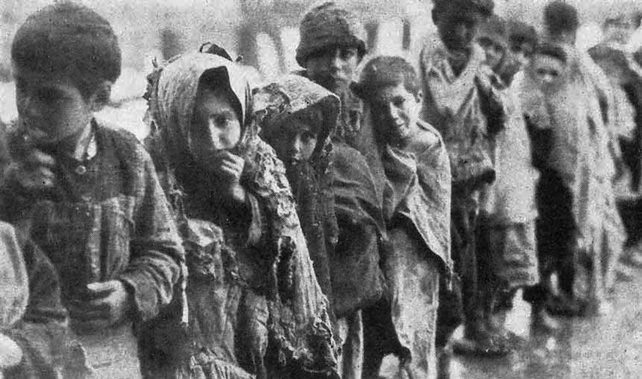
A country which holds a temporary seat on the United Nations Security Council - currently dealing with a new league of genocidaires in the form of the Islamic State - cannot take itself seriously, and cannot be considered serious by others, if it is unwilling to acknowledge the injustice in which so many other injustices find their inspiration.
As alarm clocks are being set for the early rise on ANZAC Day, thousands around the globe will be waking up to their own day of commemoration – the hundredth anniversary of the Armenian, Assyrian, and Hellenic Genocides.
It's high time these inhuman campaigns were recognised, first in our traditional narrative of ANZAC Day, and finally with a formal bill of recognition passed through Parliament.
On April 24 1915, around 250 members of the Armenian intelligentsia were arrested by the Ottoman Empire (modern-day Turkey). Most of them were killed. This was the prefiguring of what became a mass slaughter codified in law, under the shadow of the immense battles conducted at Gallipoli.
Within the next three years, Turkish and Kurdish irregulars were drafted into roaming squads which despatched the men. The rest, including children and the elderly, were sent on death marches through the deserts of modern Iraq, Syria, and Iran. There is some wrangling over the number, but 1.25 million is a reasonable estimation of the death toll.
Over 20 countries and numerous other organisations consider this a genocide under the definition advanced by Raphael Lemkin, who was so moved by the destitution that he coined the very word by which it is described.
But Turkey outright denies that ‘genocide’ is an appropriate term. It denies that the extermination of the indigenous Christian populations in the Ottoman Empire was ever official policy. In their view, to this day, the mass killings can be explained away and need never be mentioned again. Civil war is blamed for many of the piled bodies, while disease and poverty account for the rest.
But it goes further. Since Lemkin’s invention of the word, some Turks (and their supporters) not only deny the Genocide, but assert that even if it was, it could be justified. The first modern crimes against humanity are excused by those who claimed they never occurred.
As the academic Peter Balakian maintains, “Denial of genocide is the final stage of genocide because it strives to kill the memory of the event.” The Australian genocide scholar Panayiotis Diamadis put it more viscerally when he wrote the following: “Victims of genocide die twice: first in the killing fields and then in the texts of denialists who insist that ‘nothing happened’ or that what happened was something ‘different’.”
The Turkish state’s international campaigns against any country or prominent figure prepared to recognise the Genocide are astounding in their arrogance. They will do anything to ensure that the Genocide is not publicly mentioned or acknowledged
After the European Parliament published a report in March this year calling for recognition, the Turks claimed their plea was “devoid of historical reality and legal basis” and made “demands that defy logic and law.”
When Pope Francis openly spoke of the Genocide in the same manner as the Holocaust, the Vatican’s man in Ankara was immediately hauled in for explanation, and the Turkish ambassador at the Vatican was withdrawn.
Perhaps the most shocking of Turkey’s recent actions was against the members of the New South Wales parliament in Australia. Their unanimously-passed resolution in 2013 recognising the Genocide was met with a threat from the Turkish Embassy: “These persons who try to damage the spirit of Çanakkale/Gallipoli will also not have their place in the Çanakkale ceremonies where we commemorate together our sons lying side by side in our soil.”
Gulseren Celik, the Turkish Consul General in Sydney, mirrored this when she intoned that "those individuals who show no respect to our history will not be welcome in Turkey…” [Italics added]
These assertions are crucial. Because of the bond between New Zealand, Australia, and Turkey, ANZAC commemorations have codified a tremendous and eerie silence on the issue of Genocide recognition.
As I documented last week, there are intimate links between the ANZAC experience and the Armenian, Assyrian, and Hellenic Genocide. For example, at least 16 members of the New Zealand Expeditionary Force were held prisoner of war in Afyonkarahissar between mid-1915 and late-1918. If the diaries and records kept by Australians held there are anything to go by, there can be little doubt that New Zealand troops witnessed the mass killings in progress. “For in almost every town in their empire have they been massacred,” the Australian PoW Captain Thomas Walter White recorded. “Their massacre outshone any horrors elsewhere.”
In 1918, the Genocide still in full flow, ANZAC soldiers in the Dunsterforce aided in the rescue and protection of Armenian and Assyrian refugees – that death march stretching some 24 kilometres through north-west Iran. We know of at least one New Zealander – Captain Robert Kenneth Nicol of Wellington – who was killed fending off “the cruel raids of the Turks.”
With these intimate historical links in mind, New Zealand simply cannot avoid the question of recognition any longer. The country has been pulled into a bitter fight regardless: When the Turks shifted their Gallipoli commemorations (which the Prime Minister will attend alongside 2000 hand-picked New Zealanders) from April 25 to April 24, they did so knowing that this is the official day of remembrance for the Armenian Genocide.
Because of Turkish tactics, including using ANZAC Day as a political tool, this country has been forced into a horrible and tragic choice between honouring the dead of the Dardanelles and the dead of Diyarbakir.
Recognising the Genocide doesn’t require adhering to an unalterable narrative, but it would understand and appreciate the “intent to destroy, in whole or in part, a national, ethnical, racial or religious group” laid out in the Rome Statute.
Is there not a fraction of public life that can be leant towards honouring those victims? No one is asking for an expensive memorial. A simple bill of recognition would be enough for expatriate Armenians living in this country. It would certainly fulfil a moral obligation, and it would also stand tall against any form of denialism.
An official gesture given to honouring the first tragedy of the modern age would be a major step towards, at the very least, accepting a responsibility to recognise truth and respect memory, no matter the political cost.
The Turkish Embassy in Wellington did not respond to requests for comment for this column.
Take your Radio, Podcasts and Music with you









